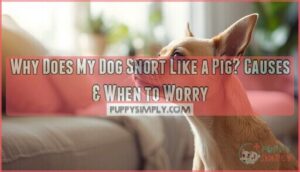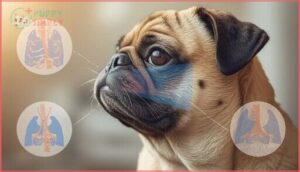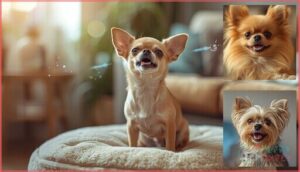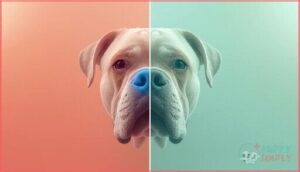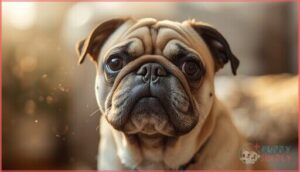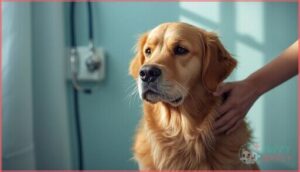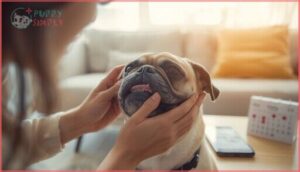This site is supported by our readers. We may earn a commission, at no cost to you, if you purchase through links.
That rapid-fire snorting sound—the one that makes your dog look like they’re impersonating a tiny pig—catches most pet owners off guard the first time they hear it. Your dog’s head extends forward, their body goes rigid, and for about 10 to 30 seconds, they make these loud, honking inhalations that seem almost alarming.
This phenomenon, often called reverse sneezing, is surprisingly common and usually harmless, though it can signal everything from seasonal allergies to anatomical challenges in certain breeds. While occasional snorting rarely means trouble, understanding what triggers these episodes and recognizing when they point to respiratory issues can help you keep your four-legged friend breathing easy.
Table Of Contents
- Key Takeaways
- Why Does My Dog Snort Like a Pig?
- Breeds Prone to Snorting
- Common Causes of Dog Snorting
- Signs Snorting May Indicate a Health Issue
- What to Do if Your Dog Keeps Snorting
- Frequently Asked Questions (FAQs)
- Why is my dog making pig noises?
- How to tell if a dog has nasal mites?
- What are the first signs of heart failure in dogs?
- Why does my dog make a huffing sound?
- How can I stop my dog from snorting?
- Is dog snorting a sign of pain?
- Why does my dog snort when excited?
- Can dog snorting be a sign of illness?
- How often is normal for a dog to snort?
- Can snorting lead to serious breathing complications?
- Conclusion
Key Takeaways
- That pig-like snorting sound is usually reverse sneezing—a harmless spasm in your dog’s soft palate triggered by irritants like pollen, dust, or household cleaners, and it typically resolves on its own within seconds to a minute.
- Flat-faced breeds like Pugs and Bulldogs snort more often because their compressed airways and shortened snouts make breathing naturally noisier, though any dog can experience reverse sneezing from excitement, allergies, or environmental triggers.
- You should call your vet if snorting comes with labored breathing, colored nasal discharge, persistent coughing, lethargy, or lasts longer than a few minutes—these signs can point to infections, airway obstructions, or other respiratory problems that need professional attention.
- Keeping your dog at a healthy weight, reducing household irritants, and managing allergies can significantly cut down on snorting episodes, especially since extra pounds put pressure on airways and make breathing harder.
Why Does My Dog Snort Like a Pig?
That pig-like snort from your dog can catch you off guard, especially if it’s the first time you’ve heard it.
A clicker can help you mark the exact moment your dog does something right, whether it’s that first sit or staying calm during a snorting episode—here’s how clickers work for beginners.
Most of the time, it’s completely harmless—just your pup’s body reacting to something minor. Let’s look at the main reasons dogs make this funny (and sometimes alarming) sound.
Reverse Sneezing Explained
That pig-like snorting you’re hearing might be reverse sneezing—a rapid series of inhalations that creates honking or snorting sounds from your dog’s nose and throat. It happens when irritation in the nasopharynx causes the soft palate to spasm, briefly affecting the airway.
Most episodes last just seconds to a minute, then your dog’s breathing returns to normal on its own. Certain breeds are more prone to reverse sneezing episodes, so keep an eye out if your dog is affected often.
Excitement or Playful Behavior
Sometimes your dog’s snorting isn’t from irritation—it’s pure canine enthusiasm. Playful energy and excitement triggers can cause rapid breathing that sounds like pig-like snorts, especially during chase games or greeting routines.
Here’s when dog snorting reflects normal play behavior:
- Wagging tail and loose body posture accompany alert facial expressions during play bursts
- Short sprints toward toys or people occur within 5 to 15 second windows
- High-pitched vocalizations align with moments of joyful dog socialization
- Bouncy gait increases when your dog’s excited to engage in play
- Soft eyes and relaxed ears indicate friendly canine behavior during interaction
This kind of dog behavior is completely normal and shows healthy canine enthusiasm.
Allergies and Environmental Irritants
While playful snorts usually stop when the fun winds down, allergies and environmental triggers can keep your dog huffing long after playtime ends.
Pollen exposure, cigarette smoke, air fresheners, and pet allergens irritate the airways, causing nasal congestion and respiratory problems.
High air quality days help, but irritant avoidance—skipping heavy fragrances and keeping windows closed during pollen peaks—makes the biggest difference in reducing allergy-driven snorting. For more details on allergy symptoms and possible remedies, refer to this information on environmental allergies and treatments.
Foreign Objects in The Nose
Beyond allergies, sudden snorting paired with unilateral discharge often signals a foreign object lodged in your dog’s nose. Grass seeds, food particles, or toy bits can trigger breathing difficulties and nasal and sinus issues in dogs.
Removal methods range from simple extraction to endoscopy, depending on depth. Complication risks include mucosal damage and infection, so diagnostic steps by your vet are essential when dog snorting appears alongside respiratory problems.
Breeds Prone to Snorting
If your dog snorts like a pig, there’s a good chance their breed plays a role. Some dogs are simply built in a way that makes snorting more common—it’s part of their anatomy, not necessarily a health problem.
If snorting comes with other symptoms like fatigue or wheezing, it could mean your dog is uncomfortable—signs dogs show when they’re cold can sometimes overlap with respiratory issues.
Let’s look at which breeds are most likely to snort and why their unique features matter.
Brachycephalic Breeds (Pugs, Bulldogs, Etc.)
If your dog has a flat face and a short snout, snorting sounds are almost part of the package. Brachycephalic breeds like Pugs, French Bulldogs, English Bulldogs, and Boston Terriers come with unique facial anatomy that creates breathing difficulties. Their shortened upper jaw and crowded airways make reverse sneezing and snorting common.
Here’s what makes these breeds prone to respiratory health challenges:
- Narrowed nostrils limit airflow during normal breathing
- Elongated soft palate can extend into the airway
- Compressed nasal passages reduce efficient air intake
- Tissue crowding increases risk of airway obstruction
Understanding your brachycephalic breed’s anatomy helps you recognize when snorting is normal versus concerning.
Small and Toy Breeds
Your Chihuahua, Pomeranian, or Yorkshire Terrier can also experience frequent snorting sounds, though for different reasons than brachycephalic breeds. Toy breed care requires awareness of collapsing trachea, a condition where the windpipe weakens and narrows. This canine anatomy issue causes honking snorts during excitement or exercise.
Small breed health challenges include reverse sneezing triggered by environmental irritants, making snorting prevention part of responsible ownership.
Why Facial Structure Matters
Your dog’s skull shape directly determines airway size and how easily air flows through their nasal passage. Brachycephalic breeds have compressed facial anatomy that creates narrow breathing pathways, leading to snorting sounds and canine respiratory issues.
This dog anatomy affects breathing patterns during rest and activity, making reverse sneezing and labored breathing more common in flat-faced pups than breeds with longer snouts.
Common Causes of Dog Snorting
You’ve probably noticed your dog snorting at different times—maybe after a quick run around the yard, or seemingly out of nowhere while resting on the couch. While some snorting is perfectly normal, understanding what triggers it can help you tell the difference between harmless quirks and signs that something’s not quite right.
Let’s look at the most common reasons dogs make that pig-like snorting sound.
Reverse Sneezing Triggers
Your dog’s snorting episodes often start with nasal irritants or airborne allergens like pollen, dust, and household cleaners. These triggers spark reverse sneezing—a rapid inhalation reflex that sounds alarming but usually isn’t serious.
Watch for these common culprits:
- Strong fragrances from air fresheners or cleaning products
- Seasonal allergens and environmental dust
- Excitement during play causing rapid breathing
Most episodes resolve within seconds, though a foreign object stuck in the nose requires immediate attention.
Respiratory Infections
When your dog catches a bug, snorting may signal more than reverse sneezing. Viral infections and bacterial pneumonia cause nasal congestion alongside persistent coughing and labored breathing.
Airborne pathogens spread easily in kennels or dog parks, triggering respiratory issues that worsen without treatment.
If snorting comes with fever, thick discharge, or lethargy, these infections can progress toward chronic coughing or even respiratory failure—so don’t wait to call your vet.
Obesity and Airway Pressure
Extra weight acts like a heavy blanket on your dog’s chest, pushing fat against airways and making every breath harder work. Obesity narrows air passages and reduces ventilatory efficiency, forcing labored breathing even at rest.
Excess weight presses on your dog’s airways like a heavy blanket, narrowing passages and forcing labored breathing even at rest
This respiratory strain hits brachycephalic breeds especially hard, turning mild snorting into serious breathing difficulties as airway resistance climbs with each added pound.
Nasal or Throat Irritation
Smoke, perfumes, and cleaning chemicals inflame nasal passages and throat tissue, prompting your dog to snort as a reflex. Allergies, nasal mites, and mucous buildup worsen irritation, while foreign objects stuck in the nose trigger reverse sneezing episodes.
Throat infections, nasal polyps, and anatomical issues can narrow airways further, turning occasional snorts into chronic respiratory noise that demands veterinary attention.
Signs Snorting May Indicate a Health Issue
Most of the time, snorting is harmless—just a quirky noise your dog makes. But there are moments when it’s your dog’s way of telling you something isn’t right.
Here are the warning signs that mean it’s time to pay closer attention or call your vet.
Labored Breathing or Wheezing
Watch closely if your dog’s snorting shifts into raspy, high-pitched wheezing sounds—that’s often a sign of airway obstruction or tracheal collapse.
Respiratory problems in dogs can start with reverse sneezing, then escalate to continuous labored breathing, especially after activity.
If you notice your pup struggling to catch their breath or hear wheeze during exhale, it’s time to call your vet.
Persistent Nasal Discharge
Beyond wheezing, keep an eye out for any nasal discharge lingering more than a day or two. Clear, runny mucus often points to allergies or reverse sneezing, while thick, yellow or green nasal mucus can signal a respiratory infection or sinus infections.
- Blood-tinged discharge may indicate nasal polyps or nasal tumors
- Chronic drainage suggests inflamed mucous membranes needing veterinary evaluation
- Discharge types help your vet pinpoint the underlying cause
Excessive Drooling or Panting
While nasal discharge tells part of the story, sudden excessive drooling paired with snorting often flags respiratory infection, mouth health issues, or breathing difficulties. Dogs facing airway obstruction or respiratory problems may pant heavily and drool more than usual—your body’s cooling system working overtime.
| Symptom | Possible Trigger | Action |
|---|---|---|
| Heavy panting + drool | Heatstroke or obesity | Cool environment, weight check |
| Drooling with gagging | Throat irritation | Vet exam for obstruction |
| Blood-tinged saliva | Dental abscess or tumor | Immediate dental evaluation |
Heatstroke prevention and saliva control become critical when dog snorting escalates to labored breathing. If you notice persistent drooling alongside snorts, don’t wait—canine respiratory health hinges on quick intervention. Panting causes range from excitement to serious respiratory infection, so understanding drool reduction strategies and recognizing when your pup struggles to breathe helps you catch problems early.
Changes in Energy or Appetite
Energy Shifts and Appetite Changes that accompany snorting often signal your dog’s body is fighting something. When Respiratory Problems or allergies drain your pup’s resources, you’ll notice subtle behavioral shifts that speak volumes about their health.
- Lethargy paired with reduced interest in meals may indicate Respiratory Infection or systemic illness
- Sudden hunger spikes can reflect Metabolic Rates adjusting to inflammation or stress
- Food Sensitivities appearing alongside snorting suggest overlapping allergic triggers
- Decreased playtime energy often precedes more obvious Dog Health Issues
- Appetite fluctuations combined with breathing changes warrant immediate Veterinary Care
Watch for these energy and Nutrient Needs patterns—Dog Behavior rarely changes without reason.
What to Do if Your Dog Keeps Snorting
If your dog snorts occasionally and seems otherwise healthy, you probably don’t need to rush to the vet.
But when snorting becomes frequent, intense, or happens alongside other symptoms, it’s time to take action. Here’s what you can do to help your dog breathe easier and know when professional care is necessary.
When to See a Veterinarian
If your dog’s snorting lasts longer than a few minutes or repeats in cycles hours apart, it’s time for a vet visit. Breathing difficulties, colored nasal discharge, or snorting paired with coughing signal potential airway obstructions or respiratory problems in dogs requiring immediate veterinary care.
| Symptom | What It May Mean | Action Needed |
|---|---|---|
| Persistent snorting with labored breathing | Nasal irritation or collapsed airways | Schedule veterinary advice promptly |
| Colored or foul-smelling nasal discharge | Infection, polyps, or foreign bodies | Vet visits to diagnose and treat |
| Snorting with lethargy or fever | Systemic illness or dog health issues | Emergency care may be required |
| Chronic noisy breathing worsening with exercise | Structural airway problems | Evaluation for breathing issues |
Don’t wait if snorting coincides with gagging, choking, or your dog seems unusually tired—these snorting symptoms deserve professional attention to rule out serious respiratory problems in dogs.
Home Care and Prevention Tips
Keeping your home clean helps prevent breathing difficulties and snorting episodes. Use pet friendly cleaning products and run a humidifier set to 30-50 percent to ease airways.
Air purification systems reduce allergens like dust and pollen. Safe flooring without loose rugs cuts irritants that trigger reactions.
These simple dog health steps improve pet care and minimize the need for constant veterinary advice on allergies.
Managing Allergies and Irritants
If allergies are causing your dog’s snorting, start with Irritant Removal by tracking down triggers in Indoor Air. Pet Dander, household cleaners, and cigarette smoke often spark nasal irritation and breathing difficulties.
Allergy Testing through your vet pinpoints specific allergens behind dog snorting and allergic reactions, so treatment targets the real problem. Pollen Control means closing windows on high-count days and wiping paws after walks.
Weight and Lifestyle Adjustments
Extra pounds press against your dog’s throat, turning healthy breathing into labored snorts and wheezes. Keeping your pup at a healthy weight through diet management and regular exercise—7,000 to 10,000 steps daily—reduces pressure on airways.
Routine care that includes stress reduction and consistent meal timing helps prevent breathing difficulties while supporting overall canine respiratory health and dog health.
Frequently Asked Questions (FAQs)
Why is my dog making pig noises?
Ever noticed that odd honking sound coming from your pup? Your dog’s pig-like noises commonly stem from reverse sneezing—a harmless throat spasm that makes air rush rapidly through narrowed nasal passages.
How to tell if a dog has nasal mites?
Watch for nasal discharge that’s bloody or yellowish, noisy breathing patterns, frequent nose pawing, and visible crusting around nostrils.
Your vet can confirm nasal mites through endoscopy or nasal flushing to guide treatment.
What are the first signs of heart failure in dogs?
Persistent congestive heart failure at night, rapid breathing while resting, and tiring quickly during walks often signal early symptoms.
You might also notice pale gums, reduced appetite, or abdominal swelling requiring immediate veterinary care.
Why does my dog make a huffing sound?
A huffing sound usually signals a quick airway clearing—your dog pushes out irritants, mucus, or reacts to nasal irritation.
Brachycephalic breeds huff more due to narrowed breathing patterns and canine anatomy differences.
How can I stop my dog from snorting?
You can’t fully stop snorting in brachycephalic breeds, but you’ll reduce episodes by managing weight, switching to harnesses, removing airway irritants, gently massaging the throat during reverse sneezing, and treating underlying respiratory problems.
Is dog snorting a sign of pain?
Snorting doesn’t always mean pain in dogs. Breathing difficulty, collapse, or new persistent snorting with distress signals warrants a vet visit.
Pain-related snorting usually comes with grunting when touched or moving.
Why does my dog snort when excited?
Ever wonder why your pup suddenly sounds like a barnyard animal? When dogs get excited, rapid breathing creates sharp nasal sounds—a normal energy release tied to heightened emotional responses and typical canine behavior patterns.
Can dog snorting be a sign of illness?
Yes, snorting can signal illness. Respiratory issues like infections, nasal obstructions, or chronic breathing difficulties may cause persistent snorting sounds.
Watch for nasal discharge, wheezing, or lethargy—these health concerns warrant veterinary attention.
How often is normal for a dog to snort?
A few snorts daily during excitement or sniffing is typical for most dogs.
Brachycephalic breeds naturally snort more often due to their facial anatomy. Watch for increased frequency alongside breathing difficulties or nasal discharge.
Can snorting lead to serious breathing complications?
While occasional snorting is usually harmless, chronic episodes can cause airway obstruction and breathing difficulties in dogs.
Brachycephalic breeds face higher risks of tracheal collapse, chronic inflammation, and respiratory failure without proper management.
Conclusion
Most episodes of pig-like breathing won’t send you rushing to the emergency vet—they’re just your dog’s quirky way of clearing their airways.
Still, knowing why your dog snorts like a pig helps you separate harmless hiccups from red flags that deserve medical attention.
Watch for patterns, trust your instincts when something feels off, and remember that a quick vet visit beats second-guessing yourself. Your dog’s breathing matters, and you’re the best advocate they’ve got.
- https://pangovet.com/talk-to-a-vet-online-dog-preventative-wellness/?utm_source=dogster&utm_medium=article&utm_campaign=dog-preventative-wellness&utm_content=why-does-my-dog-snort-like-a-pig
- https://onlinelibrary.wiley.com/doi/full/10.1111/jsap.12286
- https://www.acvs.org/small-animal/tracheal-collapse
- https://www.msdvetmanual.com/respiratory-system/respiratory-diseases-of-small-animals/canine-nasal-mites
- https://phoenixvetcenter.com/blog/214731-how-powerful-is-a-dogs-nose

